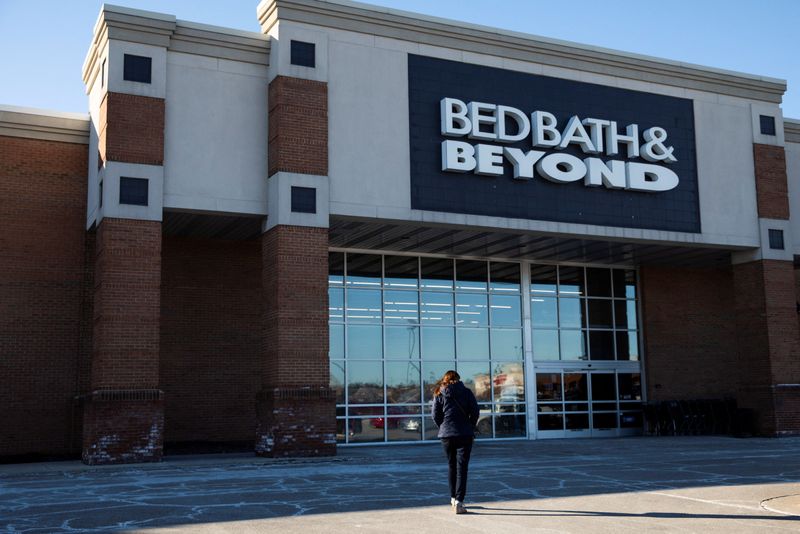By Siddharth Cavale and Arriana McLymore
NEW YORK (Reuters) -With Bed Bath & Beyond Inc (NASDAQ:BBBY) set to disclose a financial lifeline -- a roughly $375 million loan -- investors hope the retailer's interim CEO Sue Gove also will provide specifics on how she plans to rebrand the chain and steer it back to profitability when she speaks on Wednesday.
Once known for providing many shoppers with 20%-off coupons, Bed Bath & Beyond overhauled its merchandise in recent years to focus on own-brand, or private-label, products including its Our Table brand cookware. But the retailer's strategy flopped. Sales plunged 25%, and it lost $358 million in its first quarter ended May 28.
Investors on Wednesday will want an update on how Bed, Bath & Beyond is managing its excess inventory and its private-label strategy. Bed Bath nixed one of its new private-label brands, Wild Sage, after customers snubbed the products, according to Jane Hali & Associates analyst Jessica Ramírez. With inflation near 40-year-highs, investors want "greater clarity on pricing strategy going forward," said David Klink, senior equity analyst at Huntington Private Bank. Using coupons to drive sales is "not sustainable strategy in the long term," Klink added.
Ramírez said that "more than anything," the chain "needs almost an entire rebrand that's going to draw in the customer."
Investors also hope the retailer will disclose any progress it has made finding an acquirer for its buybuy Baby chain. The U.S. baby-gear seller, with more than 130 stores, could command anywhere between $630 million to $910 million, Wedbush analysts estimate. But while a sale would bring upfront cash, it would remove a source of future revenue, analysts have cautioned.
Bed, Bath & Beyond's largest investor, Ryan Cohen, co-founder of online pet store Chewy (NYSE:CHWY) Inc, sold his 9.8% stake earlier this month, sending shares crashing nearly 40% after a meme-fueled rally.
Bed, Bath & Beyond had said in late June there was interest in the buybuy Baby chain from potential acquirers, and Cohen encouraged the retailer to seek out options for the chain earlier this year, according to a securities filing.
At Bed, Bath & Beyond, inventories rose 12.5% during the quarter ending May 28. Between June 3 to Aug 22, at least 22 ships from Asia carrying 40 large containers of Christmas and Halloween merchandise arrived at U.S. ports destined for Bed, Bath & Beyond stores and distribution centers, data from sea-freight refund consultancy Ocean Audit shows.
The chain has closed roughly 200 stores over the last two years, and could try to shutter more to conserve cash, though it faces steep costs in doing so.
Roughly 25% of Bed Bath & Beyond’s approximately 900 remaining stores are likely unprofitable, a source familiar with the matter said.
Bed Bath & Beyond will look for more rent relief from landlords moving forward, the source said.
Bed, Bath & Beyond last week was finalizing a $370 million loan deal with investment firm Sixth Street. The company said in mid-August it was working with financial advisors and lenders on strengthening its balance sheet.

In the quarter ended May 28, it burned through $332 million in cash, leaving it with a $108 million cushion, even after borrowing $200 million from a credit line. A year ago, the company had $1 billion in cash reserves.
The chain's shares, which have whipsawed over the past month but still managed to more than double in value, closed down 9.3%at $12.11 on Tuesday ahead of the retailer's expected announcements on Wednesday.